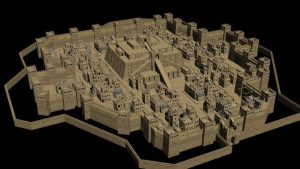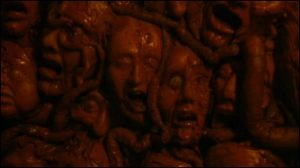From their perspective at the stone circle, the group can see the mound in the distance, the gate visible from an impossible distance, from what Utana can determine, the distance is an hour’s walk away, but it and the shining crystals that surround it are visible to the group that long distance away. It was noted that the shining crystals and the mound are not visible from anywhere other than the path from the stone circle.
Farshad’s man that acts like a crow is still perched on his spare mule, Arpaesis’s ghost-child is still there, its face as indistinct as ever, though it seems closer to him, almost see,in to reach up to hold his hand.
As they get closer, and the road is straight as an arrow and descents, gradually but constantly, until, by the time they reach the gate, they are far below the ground level, a ground level that was sodden on the way here. Why is it not flooded? Why, as they got closer, did the mound and and gate seem to shrink in proportion, so that the field of view occupied by t remains the same no matter how close they get?
The gate frame was engraved with ancient symbols, seemingly related to the antique Habbarissi script used for older forms of Idarit. This Arpaesis could translate parts of. The words he could puzzle out were
– Lord
– Kabbaruk (which seems to be the name of a Lord or King)
– Negation
– Illot-nahas (Who is referred to as Lord or King of Negation)
– The gift of Illot-nahas- The kiss of the gift
– The green gift
– This is their home
Farshad had his memory stirred, he took some documents, part of the evidence in the case of the Rasghan Ilyhan Garshemi, some of his grandfather’s notes, going beyond the anatomy and medicine of the notes taken by José, the ones where his alchemetical studies crossed into abhorrences of nature. Some of the symbols on those notes are close to some of those on the surround.
(This part of the session was hampered as player’s looked at character sheets for written languages, but the names for the various writing systems had changed in the world setting between the time that the original character sheets were created, and now, so that didn’t help)
In the bright, harsh light of the crystals, Utana marshalls his strength, using the butt of his spear, looking to force the stone gate open, his strength is prodigious but the gate does not open, but he pushes it enough to show where the gate splits. Using cheap swords taken from previous enemies, Utana and José force the portal open.
The air is stagnant, the corridor ahead dark, only lit by the light from Jalabu’s magic buckler, the corridor leading to bronze doors, is amazingly clean, the walls blue glazed brick with a sharp waveform of yellow brick through it, the flow a mosaic of repeating pattern, with no obvious meaning.
Jalabu was convinced that the floor would break away under their weight, so Farshad, spreading himself over as broad an area as he could, moved along the floor. Impatient, Utana hammered the floor with his spear. Seeing this, Arpaesis touches each, and the corridor is revealed to
However, when each was touch by Arpaesis, their sight was cleared and they saw that the corridor, far from being perfect, was filthy with dust, the bricks and mosaic dull, and some cracked. This convinced Jalabu that his fears were unfounded and, after ensuring that the door ahead did not seem to be booby-trapped, the doors were opened, the handles pushed inn triggering a mechanism whose descending weights actually opened the door.
The room ahead was slightly oval, narrower sides where they entered from the south and to the north, where a bronze statue of a woman warrior stood on a marble plinth. Two other doors were West and East.
The walls are covered with painted reliefs of screaming faces of all sorts of mortals, the different varieties of face shapes, headgear and painted skins suggest a variety of peoples from different lands, though they are united in that all the faces are screaming, horror evident on their faces.
The statue is shaped, depicting the warrior in armour of an unfamiliar style, her cap covered in curved sections that are wide at the rim, narrow at the peaks. There is more of this work on the corselt, the curves alternating, greaves and vambraces complete the armour.
The right hand of the statue is resting on a shortsword on its right, the left arm is outstretched, the palm out in a gesture suggesting halt, between her feet is a depression in the plinth, the edges scalloped.
Engraved on the plinth is some Ancient Idarit of a more obscure than usual form, in the antique Habbarissi script, which Arpaesis could read.
“I guard Kabbarruk, the Great Lord,
most treasured of Illot-nahas,
wisest of all, skilled in the arts,
master of Narmatsyana.
“None shall pass that do not leave tribute
Neither the name Kabbaruk nor Narmatsyana meant anything to the group, save that Kabbaruk was mentioned on the writings surrounding the gate. They thought that Illot-nahas might be a form of the name of Lotnyas, the adversary of the religion of the Cold Ones, the one who wishes to reduce the universe to primordial Chaos.
Considering the depression on the plinth, the group considered that perhaps a liquid would be the correct offering. They tried at first a decent vintage of wine from Utana’s personal supply, but it seemed as it it was rejected, the faces on the walls moved, the faces wailed and the eyes rolled, the mouths moving as if in pain. The outstretched hand of the statue folded its fingers into its palm, leaving two fingers remaining, but the consensus of the group was that this was not a benediction.
They considered what to offer next. Utana pulled a decorated bowl from his collection of bowls he now seems to have with him. None of us could remember anything of Thais bowl, but it was noteworthy enough to be on his character sheet, so I guess it was one he picked up or was given, but whose properties, if any, have never been revealed, or established. Into that José let some blood, and that was poured into the depression *. Again the faces wailed and writhed, and only one finger was left raised.
The group decided to leave this alone whilst they thought. The headed West, finding a corridor broken by three, seemingly bottomless pits, with only narrow ledges along the walls to try and traverse. Utana established that the nearest pit was, indeed, real as far as he could feel with his spear. Farshad, although skilled and intrepid, is used to being sent alone into dark and horrible places by the rest, so he established right up front that no way was he being sent down these unfathomable gaps.
The group saw no reason to continue, so went to the other door leaving the statue chamber, this corridor was lined with po;I shed sheets of copper acting as mirrors. Jalabu got close to one and it seemed to try to draw him to itself, he resisted, aided by an amulet he possessed, and they found a narrow centre path would keep them clear of whatever baleful influence these mirrors possessed.
The room beyond had no exit, but did have a dais upon which was set a model of a city of an unknown style. It was populated mostly by painted pottery figurines, but near one end, which seemed to be the palace.temple complex, the figures were better painted, and there were some silver figurines. On the city walls were bronze figures of soldiers clad in armour either similar to the warrior in the main room, or of a long tunic reinforced with plates.

Farshad spotted that the sides of the dais were panels, removing one of them showed that under the palace, there were a few depressions as if there were compartments extending under the city streets. That caused the group to start removing the tops of the larger buildings, finding a silver key, a vessels in the form of a richly decorated pony, wearing fittings of gold, silver and saddle and blankets of enamel, containing some fluid, the golden figure of a king, and an obsidian dagger hilted in gold. That dagger gave off a feeling similar to one once possessed by Duran, currently outside looking after the man-crow and the mules.
The group considered what could be tribute in the statue’s terms. Jose and Utana made some allusions to wealth obtained by Farshad from the group however he, wounded by these jibes, pointed out that he had, with the agreement of all there, had invested the funds and provided a profitable return, the money now banked with a temple in Haraxa, and that whilst Farshad’s family had once had debts with Jalabu’s, those were now Jalabu’s to pay, and that Farshad’s character was free of stain.
They did consider if Farshad’s musical talent could be a tribute, given the mention of art on the plinth, but it was difficult for them to see how to offer that without potentially losing Farshad. So in the end they decided to put the better of the figurines into the bowl, and offer them. The rest was taken, the knife Jalabu took, handling it with gloves, he put it in his pouch, though the sharp blade still cut a little through the leather.
Returning to the room, they tipped the bowl into the depression. The faces screamed louder than ever, and started weeping blood, the last finger of the statue was curled down, but the tribute seemed acceptable, the figurines disappeared, a gap in the plinth opened up, and the floor dropped away to reveal a narrow stairway down. Jalabu skipped to the side to avoid falling down the stairs, but Utana was so surprised that he tripped backwards and slipped onto his backside.
So, one way remains only partially explored, another has just opened up, and there we left it.
* (If the bowl with the blood had been placed on the depression, rather than tipping the blood in, I might have thought this bowl valuable enough as tribute, if I could have remembered what it was for)

